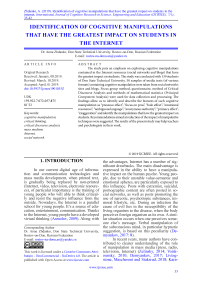Identification of cognitive manipulations that have the greatest impact on students in the internet
Автор: Anna Zhdanko
Журнал: International Journal of Cognitive Research in Science, Engineering and Education @ijcrsee
Рубрика: Original research
Статья в выпуске: 1 vol.7, 2019 года.
Бесплатный доступ
The study puts an emphasis on exploring cognitive manipulations contained in the Internet resources (social networks and blogs) that have the greatest impact on students. The study was conducted with 159 students of Don State Technical University. 50 samples of media texts (of various formats) containing cognitive manipulation were taken from social networks sites and blogs. Focus group method, questionnaire, method of Critical Discourse Analysis and methods of mathematical statistics (Principal Component Analysis) were used for data collection and processing. The findings allow us to identify and describe the features of such cognitive manipulation as “presence effect”, “focus on pros”, “halo effect”, “emotional resonance”, “ambiguous language”, “anonymous authority”, “primacy effect”, “exaggeration” and identify the manipulations that have the greatest impact on students. Recommendations aimed at reduction of the impact of manipulative techniques were suggested. The results of the present study may help teachers and psychologists in their work.
Cognitive manipulation, critical thinking, critical discourse analysis, mass medium, internet, social network
Короткий адрес: https://sciup.org/170198543
IDR: 170198543 | УДК: 159.922.7.072-057.875 | DOI: 10.5937/ijcrsee1901035Z


